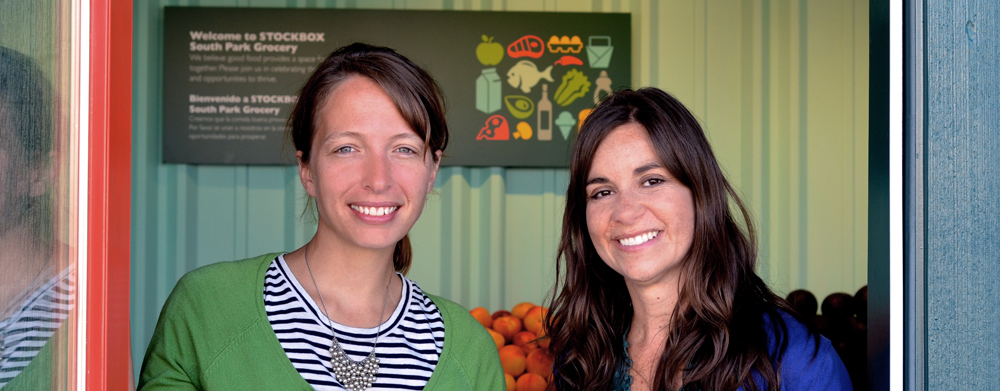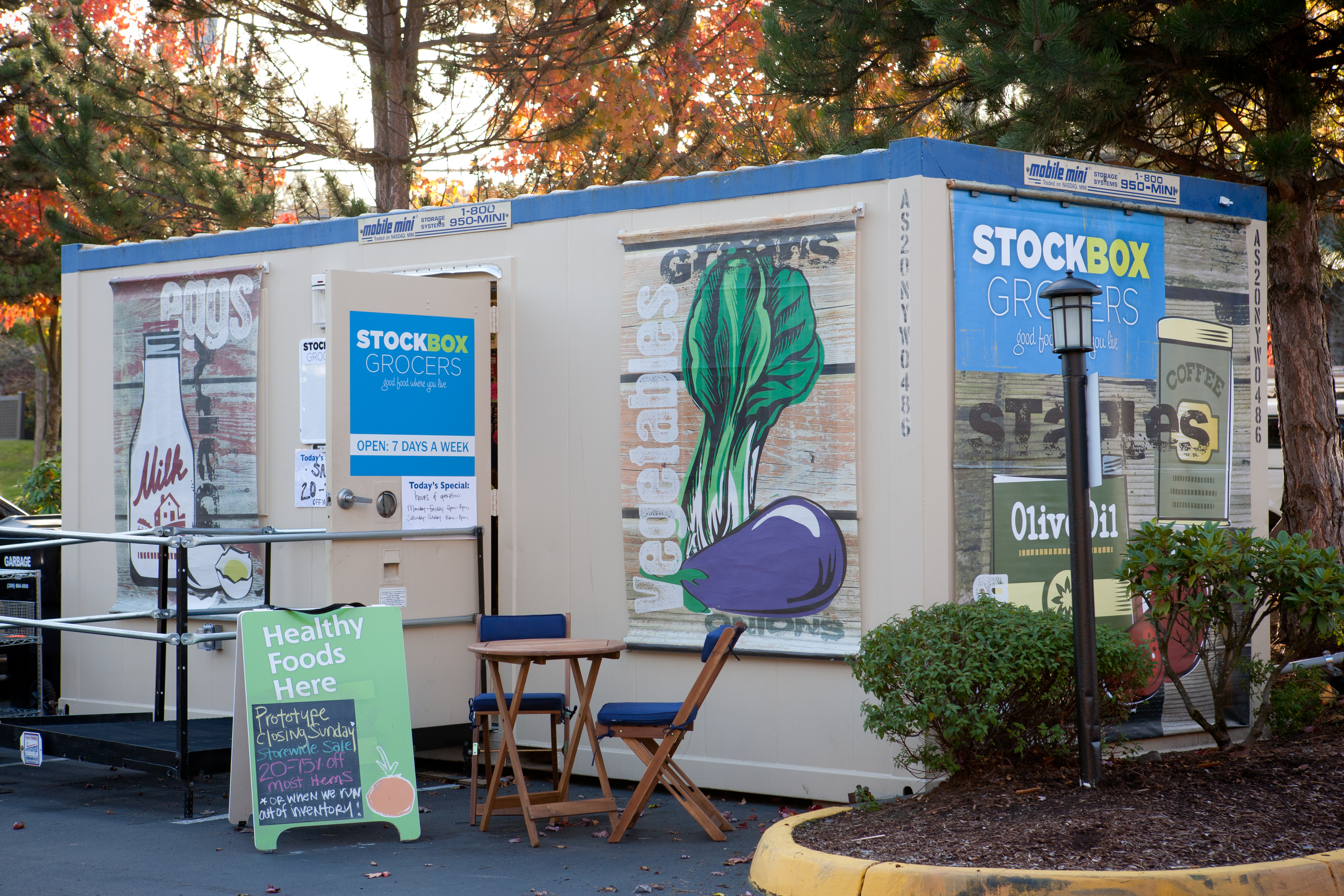
If Carrie Ferrence has her way, the world of mom-and-pop groceries will not disappear. In an era when large-chain grocery stores have replaced many family-owned corner shops, and many urban neighborhoods have little to no grocery retail, Ferrence's Stockbox Neighborhood Grocery aims to "bring fresh food back into the urban core." By doing so, the Seattle-based business aims to stave off the “food-desert” syndrome that results when neighborhoods are left bereft of grocery retail.
Ferrence's passion for the business runs in the family.  A fourth-generation grocer, Ferrence shares lore of a time when the family grocery sold everything from fresh eggs to BB pellets, and her grandparents raised a family in the apartment above the store.
A fourth-generation grocer, Ferrence shares lore of a time when the family grocery sold everything from fresh eggs to BB pellets, and her grandparents raised a family in the apartment above the store.
Ferrence and her business partner Jacqueline Gjurgevich began Stockbox four years ago as a store within a shipping container in a parking lot in West Seattle's Delridge neighborhood. They intended the shipping container store as a two-month “pop-up," and followed it by opening a small South Park location, which operated for two years.
The South Park location served as a important learning lab for the business (the location recently closed). But Ferrence and her business partner were ready to go bigger. In August 2013, they opened their 2,000-square-foot flagship store on Seattle's First Hill, adjacent to Harborview Medical Center. The ideal size and scope for its location, the store is doing well. They are planning the next space, another step toward developing a network of stores that are "the hub for fresh food, community connections, engaging experiences, and innovation in grocery," as it says on their website.
Ferrence lives in Seattle's Crown Hill neighborhood with her husband, 1-year-old son, cat and four chickens.
1. Tell us about the journey to Stockbox.
I was born and raised in rural Pennsylvania and came to Seattle about 12 years ago. After moving here, I ended up in the salvage industry, which was such an interesting world to explore because I could dive into retail, community development, construction, and policy work ... All of which has been incredibly useful in running a grocery business! My business partner and I started Stockbox several years ago in order to bring fresh food back into the urban core. It’s great work and it continues to challenge me.
2. Why are you passionate about the model?
I believe strongly in the power of retail to bring community together — it has the potential to create space in a way that a website or app will never be able to achieve. And, I believe that Stockbox can build this space in a way that transcends food and grocery.
3. What’s your favorite current project?
I’m working on starting a Community Partnership program at Stockbox, to more actively demonstrate our investment in the community. As a start-up, it’s nice to be at the place in our development where we can go deeper into our work, rather than just constantly fighting to get above water.
4. What is the best advice you received when you started down your professional path?
I have always been empowered by my family, friends and mentors to follow my passion and my strengths. This probably means I will never have a “grown-up” job or salary but I love it because it means I find myself in really creative and flexible work. This path is not just good for my professional satisfaction but for our family balance as well.
5. What are 2-3 solutions or strategies you use for “making it work” – balancing a start-up and family life?
In the big scheme of things, I am still pretty new to this parenting thing (my son is just now a year old) so I definitely haven’t “figured it out.” But my husband and I are gradually figuring out what works best for us.
Scheduling: On Sunday nights we revisit our family schedule, which involves a negotiation on who is covering our son before work and immediately after work: most nights, we both try to be home for his bedtime. We have to continually tweak our schedule, because our work needs are continually changing, but we try to keep our approach and communication consistent.
Trustworthy child care: We have very little wiggle room on our budgeting but we’ve made it a priority to invest in child care because it’s best for our son and best for us. We use a nanny share and usually hire our nanny for babysitting needs as well, so that our son has consistent care. It costs a bit more but it is much easier to leave for work every day or take a date night when you don’t need to worry.
Getting creative: Typically, I work four days a week in the office/store and have one extra work day at home with my son. We’re now working to find a way for my husband to also have more time at home. This requires a lot of creativity but it’s important to us to spend this time together as a family.

6. What's a typical workday for you?
I’m usually up between 5:45 and 6 a.m. My son is up around 7:30, so I have just over 90 minutes to get ready, eat breakfast and drink coffee. I then have around 75 minutes with him. I love this time – he is at his happiest and loves to cuddle a lot. I then head off to our office or store.
It's cliché but my work days are never really the same. I split my days between the office and the store but, since we're still very much in start-up mode, I'm usually responding to a need/issue. It can be hard to keep pushing through on a plan but I work well like this, so I usually feel pretty productive.
After lunch, I usually spend [time] on larger projects. I try to spend dinner/bedtime with my husband and son, but will usually settle into some emails and small projects after that.
7. If you could change one thing about your family/work situation, what would it be?
Can I change the cost of child care? Like I said before, I am really happy with our childcare situation and our nanny deserves every penny that we pay her but there just are not enough creative and affordable resources out there, especially for infants.
8. What are your favorite meal solutions?
Having a kid definitely adds pressure to meal preparation. Even though he’s only 1 year old, he’s a voracious eater so we’re constantly challenged to make eating a priority for all of us. We have found a few tricks:
Think big: Make a big pot of soup or a crockpot meal on Sunday nights to get the week off to a good start.
Prep vegetables in bulk: We often roast trays full of veggies on Sunday so that we always have them around.
Freeze: We make as many meals in double batches as we can, so that we often have something to pull out of the freezer.
Give yourself some easy meals: I often pick up a container of prepared soup from the grocery store so we always have one easy meal ready to go.
If all else fails, we revert to egg-and-bean tacos.
9. What are a couple of favorite outings that you do as a family?
We love going to pool or the zoo. And, with the start of another Sounders season, we’re excited for another summer of soccer!
10. What do you do once your baby is in bed?
We are grateful for having a child who is a good sleeper. He’s usually in bed by 7:15, which leaves us a lot of time to get the house back in order, finish up work and relax together. My husband plays the banjo; I’m trying to get back into sewing; and we do enjoy a bit of TV.
11. Who inspires you?
I always struggle with this question because I really don't work that way. i am driven to do good work, mostly by my belief in servant leadership. So I focus on my internal drive rather than external inspiration. I realize that sounds obnoxious but it is just how I feel and it is the approach that sustains me over the long haul.
12. Have you ever reached the point where you realized you had to do things differently as a working parent?
Every day! I’m a pretty organized and self-directed person but having a child requires constant effort in scheduling and management. Some weeks we’re good at it and some weeks we struggle with it. The only thing I can do is to continually stay present with the reason why it’s important to keep trying: the vision of the family and home we’re working hard to build.











